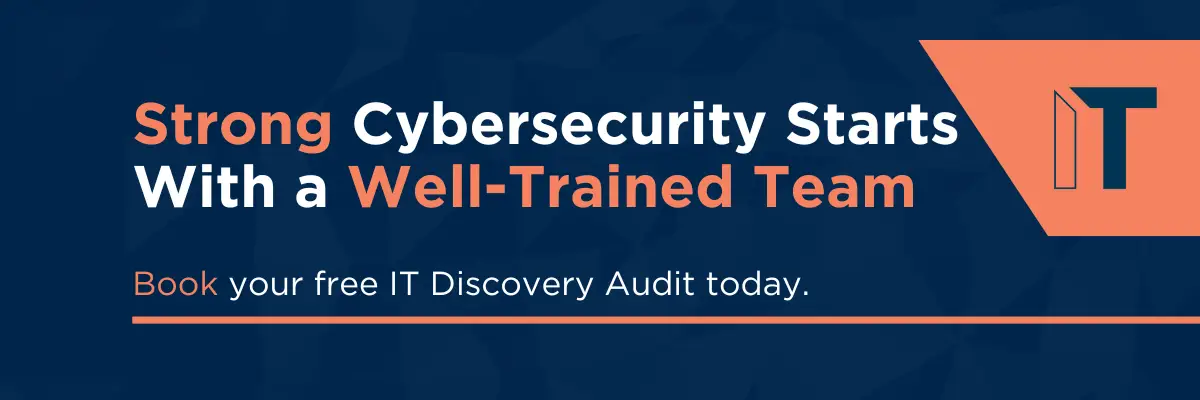Everything can change with one click. One accidental click on a fake invoice or a malicious link. One password shared one too many times. That’s the reality businesses in Glendale and across LA County find themselves facing today. Firewalls, antivirus software, and encrypted backups are all vital, but they’re not always enough anymore. The biggest cybersecurity threats aren’t just targeting systems; they’re targeting people. And with good reason – 95% of cybersecurity issues can be traced to human error.
Cybersecurity is now everyone’s responsibility.
Whether you’re in HR, finance, sales, or customer service, the decisions your team makes each day – like opening emails, using passwords, or sharing files – can either protect your business or expose it to risk. That’s why fostering a security-first mindset across your entire organization is essential.
In this blog, we’ll explore how user behavior influences your company’s security posture, why awareness training and phishing prevention are critical, and how user-focused tools like email filtering and secure backups can help turn your team into a true cybersecurity asset.
Why Cybersecurity Is No Longer Just for the IT Department
There’s a pre-existing idea of cybersecurity being something solely technical: firewalls, antivirus software, encryption. Important, yes, but something the IT team took care of in the background while everyone else got on with their jobs. But this way of thinking doesn’t fly anymore.
Modern cyber threats are designed to get past technical defenses by bypassing them altogether. They do this by targeting people. Think of phishing emails disguised as internal messages, fake login screens that look just like the real thing, or urgent requests from “the boss” asking for sensitive information. These attacks don’t rely on hacking; they rely on human error. This article from trusted IT partner Infinity Technologies explores standout cyber threats for 2025, with many examples focused on the fallibility of a human workforce.
That makes employees one of the most common entry points, but they also have the potential to be the best line of defense. Businesses in Glendale need to shift their thinking. Cybersecurity isn’t just a job for IT; it’s a company-wide responsibility. From interns to executives, everyone needs to understand how their actions impact user security and what they can do to reduce risk.
The good news? With the right training, tools, and IT support in Glendale, your team doesn’t need to be tech experts to make a huge difference.
User Security – What It Actually Means
When people hear “cybersecurity,” they often think of complicated systems running quietly in the background. But user security shifts the focus to something much more hands-on: how people use technology day to day.
At its core, user security is about giving your team the knowledge and tools they need to make smart, safe decisions at work. That includes:
- Creating strong, unique passwords (and not reusing them across accounts)
- Enabling multi-factor authentication (MFA) wherever possible
- Recognizing suspicious links, attachments, or login prompts
- Handling sensitive data responsibly, both in and outside the office
These are simple actions, but when they’re adopted consistently across a team, they form the foundation of a secure workplace.
And here’s the catch: even the most advanced cybersecurity software won’t help if a team member unknowingly clicks a phishing link or uploads a sensitive document to an unsecured folder. That’s why user security has become a top priority for businesses in Glendale and beyond. It’s the human layer of defense that makes all the difference. When your team understands what’s at stake and how to protect themselves, your entire business becomes more resilient. The data backs this up, with a study by the Ponemon Institute finding that organizations with a comprehensive security awareness training program experienced a 50% reduction in security incidents over the course of a year.
Phishing Prevention: Your New Top Priority
Phishing remains one of the most common (and dangerous) cyber threats facing businesses today, with an estimated 3.4 billion spam emails sent every day. What makes it so dangerous is its effectiveness – it works.
Phishing attacks are designed to trick employees into handing over login details, downloading malware, or transferring sensitive data. And the messages are getting more convincing, often spoofing trusted brands, suppliers, or even colleagues. In many cases, there’s no technical breach – just a well-crafted email and a moment of distraction.
Key steps to protect your team include:
- Regular phishing awareness training that shows real-world examples
- Simulated phishing tests to identify gaps and reinforce learning
- Advanced email filtering tools that catch threats before they hit inboxes
- Clear internal reporting procedures so suspicious emails don’t slip through
For businesses in Glendale, where teams often juggle hybrid work, multiple devices, and fast-paced communication, these measures are critical. When your team is prepared, phishing attempts lose their power.
The Power of Cybersecurity Awareness Training
You can invest in top-tier antivirus software, encrypted backups, and secure infrastructure, but if your staff don’t know how to spot a threat, your business is still vulnerable.
Awareness training turns your team from potential weak links into active defenders, helping them understand real-world risks and how their day-to-day actions affect the security of the entire business.
Effective training covers topics like:
- How to recognize phishing scams and social engineering tactics
- The importance of password hygiene and multi-factor authentication
- Safe practices when working remotely or using personal devices
- What to do (and not do) when something feels suspicious
The most impactful programs are ongoing, engaging, and tailored to your team’s roles and responsibilities. Quizzes, short videos, and simulated attacks keep the content fresh and relevant.
For Glendale businesses navigating hybrid work or rapid growth, regular training is essential. It helps create a security-first culture where everyone plays a part and no one’s left guessing.
Backups, Filtering & Everyday Tools that Strengthen Your People
Empowering your team doesn’t stop at training. It also means giving them the right tools to stay secure every day.
Even the most cautious employee can make a mistake. That’s why smart cybersecurity isn’t just reactive; it’s proactive. Simple, user-focused technologies act as a safety net, catching threats, preventing data loss, and supporting your staff without getting in their way.
Here are three key tools every Glendale business should have in place:
- Email Filtering
Phishing emails are getting harder to spot. Advanced filtering tools use AI and behavioral analysis to block suspicious messages before they reach your team’s inboxes, reducing the risk before anyone even has to think twice.
- Automated, Secure Backups
Mistakes happen. Files get deleted. Devices get infected. Automated cloud backups mean your business doesn’t grind to a halt when something goes wrong. Restoring data is fast and easy and doesn’t rely on remembering to hit “save.”
- Endpoint Protection and Monitoring
From laptops to smartphones, every device used for work is a potential target. Endpoint security tools provide real-time monitoring, automatic patching, and device-level control—giving your team the flexibility they need without increasing your risk.
Together, these tools reinforce the human side of cybersecurity. They don’t replace good habits, but they do back them up with strong, silent protection in the background.
Strong Cybersecurity Starts with Prepared People
Cybersecurity goes beyond what software you install. It’s about how your team thinks, acts, and responds every single day. And when everyone understands the role they play – from recognizing phishing attempts to following secure data practices – your entire business becomes stronger.
At Techital, we help Glendale businesses build people-first security strategies with the tools, training, and guidance they need to stay protected. Whether you’re looking to strengthen user security, improve phishing prevention, or assess your current setup, it starts with one simple step.
Book your free IT Discovery Audit today, and let’s uncover where your risks are – and how to fix them.


